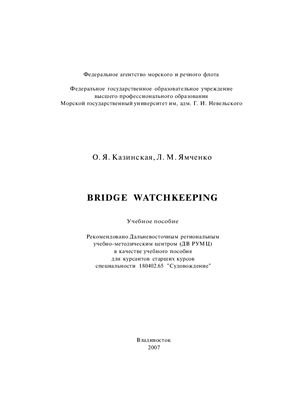Учебное пособие. Владивосток. 2007. Морской государственный
университет им, адм. Г. И. Невельского. Данное учебное пособие
рекомендовано Дальневосточным региональным
учебно-методическим центром (ДВ РУМЦ) в качестве учебного пособия для курсантов старших курсов специальности 180402.65 "Судовождение".
In many shipping companies, shipboard safety has improved greatly over the past few years. Safety awareness programmes, the regular use of safety equipment and training have made ships safer places to live in and work at. However, too many incidents, accidents and injuries still occur. Many accidents are results of lapses in concentration or have seemingly minor causes. The consequencies of such lapses can lead to accidents which vary in their severity. Under the "Inteational Safety Management Code for the Safe Operation of Ships and Pollution Prevention", more commonly
known as the Inteational Safety Management (ISM) Code, all shipping companies are required to develop a safety and environmental policy. The Code, which is an Inteational Maritime Organisation (IMO) resolution, is incorporated as Chapter IX of the Safety of Life at Sea (SOLAS) Convention and is mandatory. One of the objectives of the ISM code is to "provide for safe practices in ship operation and a safe working environment". Safety is of paramount importance and should be boe in mind before any task is attempted. In order to get this message across, it is
necessary to develop a safety culture where all staff appreciate the importance of safety. In fact, it must be their first consideration and become part of their way of life. The officers on the ship, in particular, must be totally committed to the safety culture and must be seen to actively promote and support.
учебно-методическим центром (ДВ РУМЦ) в качестве учебного пособия для курсантов старших курсов специальности 180402.65 "Судовождение".
In many shipping companies, shipboard safety has improved greatly over the past few years. Safety awareness programmes, the regular use of safety equipment and training have made ships safer places to live in and work at. However, too many incidents, accidents and injuries still occur. Many accidents are results of lapses in concentration or have seemingly minor causes. The consequencies of such lapses can lead to accidents which vary in their severity. Under the "Inteational Safety Management Code for the Safe Operation of Ships and Pollution Prevention", more commonly
known as the Inteational Safety Management (ISM) Code, all shipping companies are required to develop a safety and environmental policy. The Code, which is an Inteational Maritime Organisation (IMO) resolution, is incorporated as Chapter IX of the Safety of Life at Sea (SOLAS) Convention and is mandatory. One of the objectives of the ISM code is to "provide for safe practices in ship operation and a safe working environment". Safety is of paramount importance and should be boe in mind before any task is attempted. In order to get this message across, it is
necessary to develop a safety culture where all staff appreciate the importance of safety. In fact, it must be their first consideration and become part of their way of life. The officers on the ship, in particular, must be totally committed to the safety culture and must be seen to actively promote and support.

